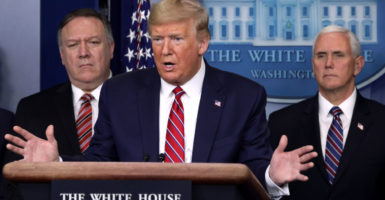In mid-March, President Nayib Bukele of El Salvador closed his country’s borders to foreigners. At that point, his country had zero confirmed cases of COVID-19, commonly known as the coronavirus.
Bukele closed down schools, temporarily shut down the international airport, and banned flights from Mexico when he believed the Mexican government allowed corona-positive passengers to board El Salvador-bound flights.
While these measures might seem extreme, to date El Salvador has only one confirmed case.
El Salvador’s actions demonstrate that borders play a key role in combatting against the coronavirus.
On Friday, the U.S. and Mexico announced a joint agreement to close their shared border for nonessential travel over the next 30 days.
This means that for the next month, the U.S. Border Patrol will immediately return illegal immigrants across the border instead of processing and holding them in immigration facilities. Points of entry across the border are operational only for trade and commerce.
Closing the border to nonessential travel while still allowing trade was the right move by President Donald Trump.
The U.S. and Mexico are each other’s largest trade partners and with the United States-Mexico-Canada Agreement, there are safety guarantees to protect lawful cross-border trade. Americans should be confident that necessary supply chains like food and manufactured goods are well-protected.
More importantly, this travel restriction protects border agents from unnecessary exposure to the coronavirus and reduces the workload they are experiencing from the border crisis.
It is also a smart move as it allows Customs and Border Protection to redirect manpower and sanitary resources that would have gone to inadmissible migrants toward first responders and critical industries.
Border agents are at the front lines and put their lives at risk every day protecting the country. With the coronavirus, they are now unwittingly risking their family, friends, and Homeland Security co-workers. Trump was right to give them this momentary reprieve and, should the crisis continue, the travel restrictions should be extended.
A recent Politico article reported that “nearly 500 Homeland Security employees are quarantined because of the novel coronavirus, and at least 13 are confirmed or presumed COVID-19 positive.”
Despite what partisan pundits in the mainstream media want you to think, travel restrictions are not racist or xenophobic. Currently, 41 countries have implemented travel restrictions or border control policies.
It is important to note that Friday’s border action was a joint agreement with Mexico. Hopefully, the Trump administration is deepening cooperation with Mexico on their domestic efforts to counter the coronavirus.
As cases of the virus increase in Mexico, the Mexican government is seriously falling behind on developing and executing a plan.
The capital city has only prohibited events larger than 1,000 people and recently allowed a concert of 70,000 people to take place.
Flight restrictions from high-risk countries are not in place and President Andres Manuel Lopez Obrador continues traveling around the country, hugging and kissing supporters.
Recently, around 400 Mexican businessmen chartered private planes to Vail, Colorado, for a skiing trip. Upon return, a few tested positive for COVID-19. The Jalisco government is looking for them and asking them to self-isolate.
Should Mexico’s lack of internal enforcement continue, the U.S. should also consider banning flights.
In the midst of a highly contagious global pandemic, definitions of normalcy are rewritten. Viruses do not respect borders or boundaries. What was extreme a month ago is now prudent and responsible.

























